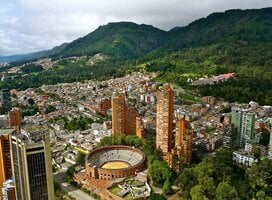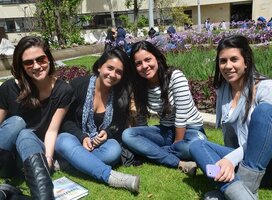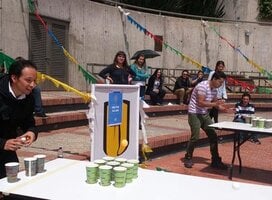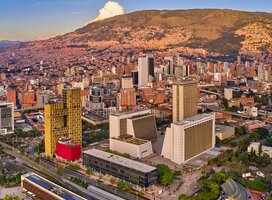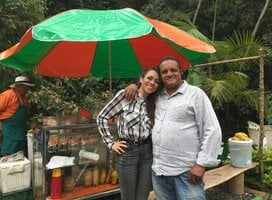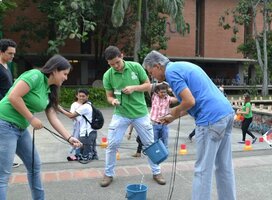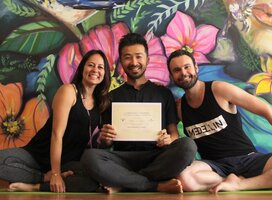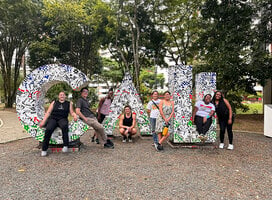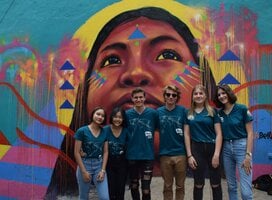Study Abroad in Bogotá, Colombia
The beating heart of an intriguing country, the towering skyscrapers of Bogota's businesses contrast with its historic colonial architecture, enticing visitors with its diversity. Add to this some of the best food and nightlife in Latin America, and you surely won't want to leave by the end of your program.
Colombia in the past few years has more than recovered its reputation as a safe destination and tourism is booming. It's an excellent place to choose to study Spanish, too, as the Colombian accent and pronunciation is easier to understand than many other South and Central American countries, particularly for first-time learners.
There are also tons of museums to explore: as with many capital cities, Bogota holds the key to Colombia's culture, in the form of its Gold museum, the Botero museum, and the Colombian national museum. There's certainly a lot to be gained from studying in Colombia's capital.
Studying in Colombia will teach you much more than just what you learn inside the classroom. It's a whole different culture, another language spoken in the streets, and a rich Latin American lifestyle to get used to.
Culture & Immersion
One of the key ways to immerse yourself in Colombian culture is by learning the Spanish language, which will help you to get under the skin of life in Colombia and give you a new skill that will be both professionally useful and personally enriching.
Culture Shock & Support
Seeing as Colombia's culture is quite different from the typical Western lifestyle, it's understandable when students feel a little overwhelmed by it all. Culture shock is totally normal, and it will pass, but it's useful to have a basic framework for dealing with these difficulties.
Some organizations have a dedicated member of staff focusing on student life, while many others have the advantage of simply having a cohort of students all going through the same experience at the same time. Having others to talk to about how you're feeling is useful when going through culture shock.
Lifestyle
Colombia is a late-night kind of place. Whether it's eating, drinking, or dancing salsa, you'll find the streets alive until the early hours of the morning. Salsa is a huge part of the culture, and you'll find it in almost any club you visit.
And of course, coffee is an integral element of Colombian life, despite much of the best stuff being shipped off for international export. A cup of tinto and a leisurely chat in the square is a favorite past time for many Colombians. You can easily spot the locals dotted around across the benches of almost any open park or crowding the street-side tables of cafes.
Insider Tips on Studying Abroad in Bogota
It's worth noting that Colombia is a country with a huge diversity of landscapes: there's the tropical Caribbean coast and the eternal spring of Medellin.
Don't expect tropical temperatures here: Bogota is sitting pretty up in the mountains, so you'll want to pack your jeans and sweaters!
If you're thinking of studying abroad in Bogota, you'll want to plan ahead a little. You'll need to choose which course you want to take, learn about different housing options, and think about the logistics of getting to your placement in a new city. But don't worry -- we've done some of the research for you.
Course Types
There are three main types of courses available for study in Bogota: direct enrollment, direct exchange, and third-party provider. This essentially dictates whether your study is set up through the university you're studying at, your own university, or a different organization entirely.
More broadly, there are formal and informal studying options, as well as English and Spanish-based courses. You might study through an educational institution such as the National University of Colombia (direct enrollment), or simply take Spanish classes through a local language school.
Language courses will be conducted primarily in Spanish, but there are also academic courses, such as Red Tree Study's Peace Building course, that are led in English.
Housing
Depending on which program you choose, there are a number of possibilities for accommodation. Some programs include accommodation as part of their service, so you might be living in a local hotel with fellow students if you enroll with one of these. If you're taking part in an academic exchange, you'll likely wind up staying in a student dormitory.
You may also have the choice to experience true cultural immersion by staying with a local family in a homestay. This might seem intimidating, but it'll certainly improve your Spanish, and most students who take part in a homestay develop very close bonds with their host family.
For more informal study at a local Spanish school, you'll have to organize accommodation for yourself -- but that's okay, because there are lots of great places to stay in Bogota! Plus, staying in a shared flat or hostel is a great way to meet fellow travelers.
Transportation
Bogota has an excellent transport system. The TransMilenio bus service is extensive and easy to navigate. The bus system across the country is also very straightforward, though buses may take a while, and tickets are sometimes better booked the day before.
A burning question on most people's minds when planning an adventure like this is: how much is it going to cost me? While you can't put a price on a life-changing experience living in another country and learning one of the most widely-spoken languages on Earth, you certainly can put a price on visas, the cost of living, and subleasing an apartment.
Cost of Living
Relative to the Western world, the majority of South America is very affordable. However, capital cities carry an additional premium, and Bogota is no exception.
For a rough idea, here are some examples of the average prices of necessities in Bogota:
- Night in a hostel (dorm): $10-$15
- Night in a hotel: from $30
- Beer: around $2
- Meal (local restaurant): $5
- Meal (international restaurant): $15
- Grocery shopping: $60-$100 per week
Visas
The type of visa you need will depend on what type of study abroad course you are planning to enroll in.
Regular visitors to Colombia can get 90 days free without having to apply for a visa, but if your study program is longer than this or is part of a formal course, you'll have to apply according to the instructions provided by your institution.
The Colombian visa system has recently been simplified so that there are only three visa categories. The two which might concern students are the Visitante and Migrante visas.
For high school and undergraduate-level study, you'll need a Migrante (M-9) visa; for post-grad and academic exchanges, you'll need to apply for a Visitante visa.
Can You Work While Studying in Bogota?
In general, you're not eligible to work in Colombia while studying due to M-9 visa restrictions. There's some gray area with regards to working on the Visitante visa, so it's best to check directly with the Colombian consulate in your home country before traveling to understand the details.
If you're interning or just studying informally on the side, the restrictions may be different. Again, check with government representatives of Colombia for answers.
Scholarships
Not all programs in Bogota will be able to offer scholarships through the school or company themselves. However, there are other options for financial support. For example, the US State Department offers merit-based funding for excellent students, and your own university may have the capacity to offer support. Contact the international office, as well as your own faculty to find out what opportunities they offer.


